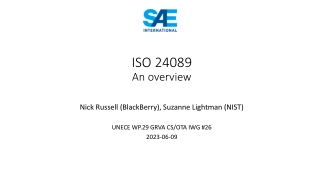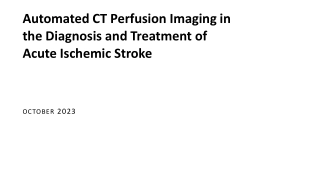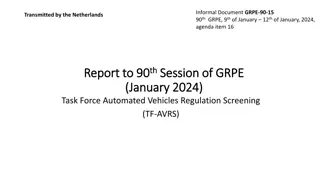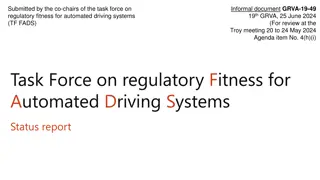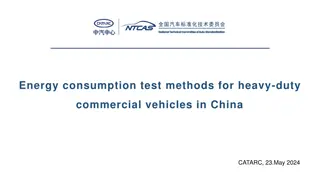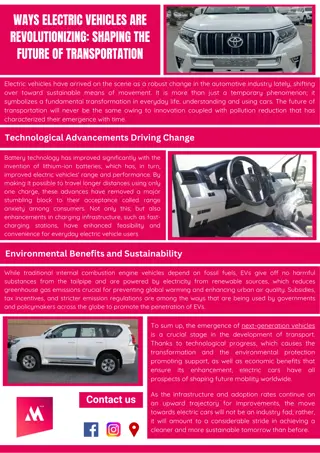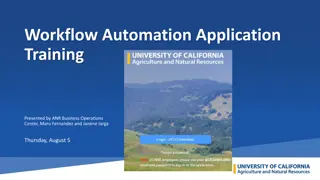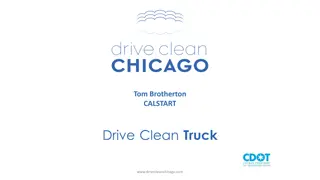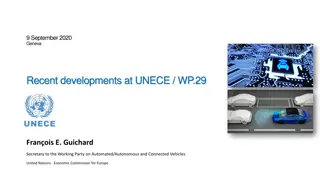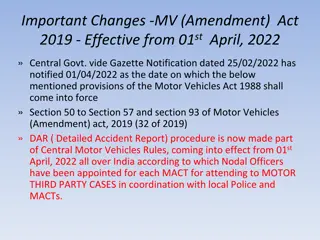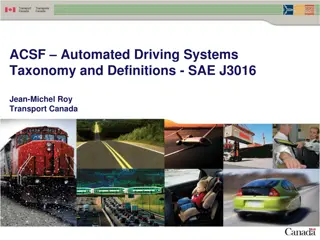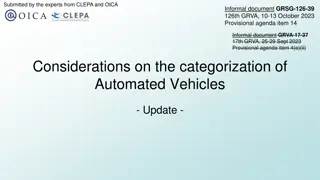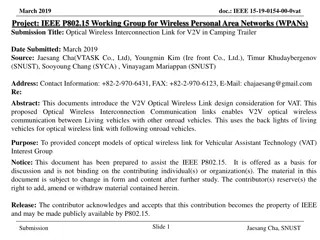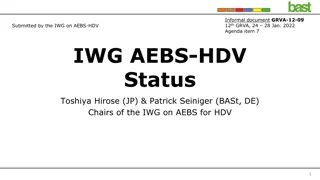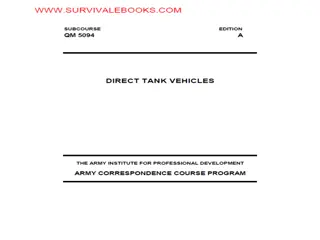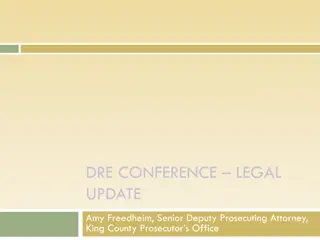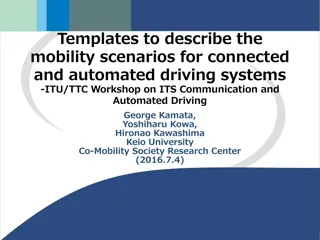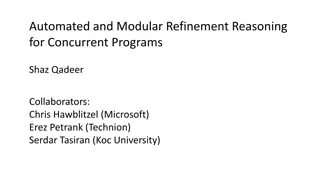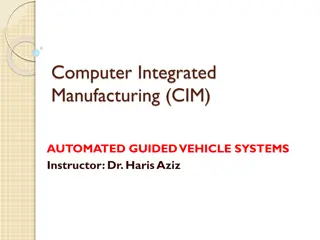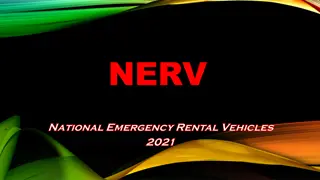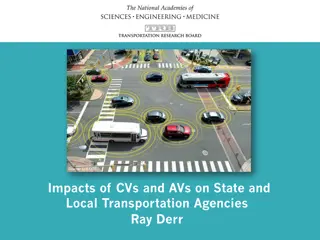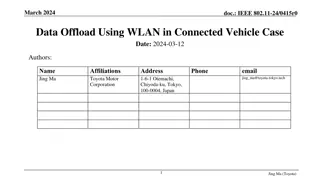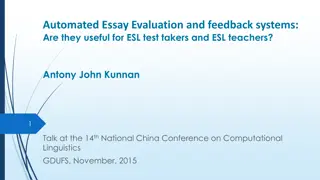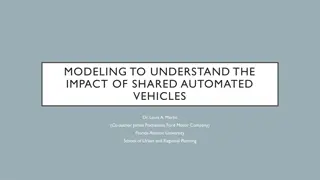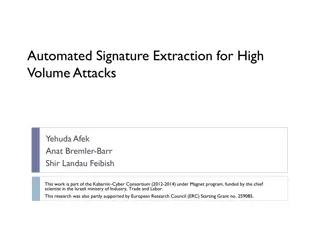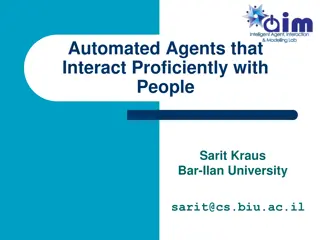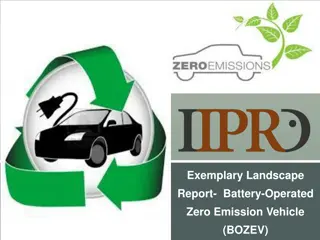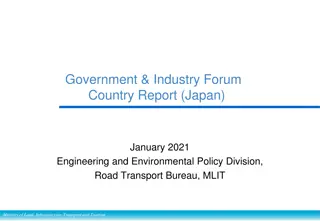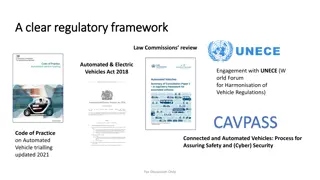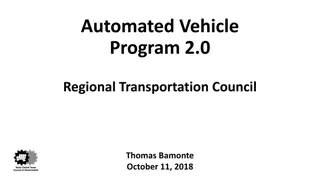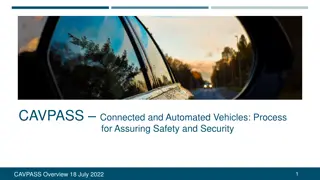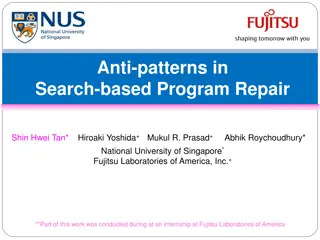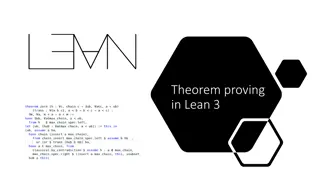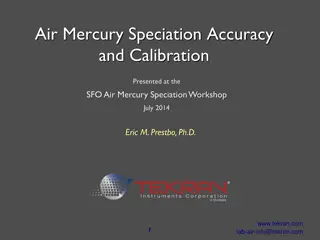Considerations on the categorization of Automated Vehicles
Review existing vehicle categories for automated vehicles (AVs) and proposes new subcategories to address different AV use cases. The aim is to ensure that regulations align with specific AV use cases and provide a logical structure for categorization.
7 views • 9 slides
Status Report: Task Force Automated Vehicles Regulatory Screening (TF-AVRS) of UN Regulations and GTRs under Responsibility of GRSP
This status report provides an overview of the progress made by the Task Force Automated Vehicles Regulatory Screening (TF-AVRS) in evaluating the UN Regulations and GTRs falling under the responsibility of GRSP. It discusses the background, affected regulations, interaction with other GRs, and the
2 views • 13 slides
Overview of ISO 24089: Software Update Processes in Vehicles
This overview delves into the ISO 24089 standard, focusing on the engineering processes related to software updates in vehicles. It covers the background, scope, coverage, and key terminology, highlighting the importance of safe and secure software updates in modern vehicles.
4 views • 14 slides
Automated CT Perfusion Imaging in Acute Ischemic Stroke: Overview
This presentation delves into the significance of automated CT perfusion imaging in diagnosing and treating acute ischemic stroke. It covers essential information such as the burden of stroke in Ontario, the critical aspect of time in stroke treatment, hyperacute stroke treatment goals, and the impo
4 views • 41 slides
Electric Vehicle Informal Working Group Progress Report
The report provides an update on the Electric Vehicles and the Environment Informal Working Group's recent meetings, current work on hybrid power determination and in-vehicle battery durability, and developments in GTR-21 and GTR-22. The group is focusing on refining test procedures, considering CAN
2 views • 13 slides
Sustainability Benefits and Transition to LED Technology in Vehicles
Explore the sustainability benefits of LED technology in vehicles, focusing on improvements in energy efficiency and CO2 savings. The transition from halogen to LED technology is projected with significant potential for reducing carbon emissions. The acceleration of this transition through LED repla
3 views • 5 slides
Exploring the impact of automated indexing on completeness of MeSH terms
This study delves into the effects of automated indexing on the thoroughness of MeSH terms. It addresses the novelty of automated indexing, its implications for teaching, questions raised by students, observed missing index terms, and the significance of MeSH in practice. The explanation of how auto
4 views • 33 slides
Task Force Automated Vehicles Regulation Screening Report
The Task Force Automated Vehicles Regulation Screening (TF-AVRS) conducted multiple meetings and screenings to evaluate regulations and terms related to automated vehicles. The report outlines the screening process, considered items, results, and future plans for regulation screening in the automoti
0 views • 9 slides
green hydrogen market
green hydrogen is used as fuel to provide a sustainable mobility alternative. Fuel cells make vehicles more efficient and quieter; using green hydrogen allows vehicles to travel longer distances with less refueling. The increase in demand for green hydrogen is also due to growing government initiati
1 views • 3 slides
Task Force Report on Regulatory Fitness for Automated Driving Systems
The co-chairs of the Task Force on Regulatory Fitness for Automated Driving Systems presented an informal document at the 19th meeting of GRVA, outlining the context, purpose, and status of regulations related to automated vehicles. The report focuses on the need for a regulatory environment for aut
1 views • 10 slides
Energy Consumption Test Methods for Heavy-Duty Commercial Vehicles in China
China has released energy consumption testing methods for various types of fuel vehicles, including traditional fuel vehicles, hybrid electric vehicles, battery electric vehicles, fuel cell vehicles, natural gas vehicles, and methanol vehicles. The standards cover test methods for fuel consumption a
4 views • 15 slides
Shaping The Future Of Next-Generation Vehicles
Introducing our next-generation vehicles, the pinnacle of automotive innovation. These cutting-edge vehicles are at the forefront of technological advancement and are designed to be highly efficient, environmentally friendly, and technologically adva
2 views • 1 slides
Automated Workflow Forms Training & Implementation Overview
Learn about the automated workflow forms training and implementation presented by ANR Business Operations Center on August 5th. Understand the purpose, steps, and support available for the process involving various forms related to funding, purchases, and more. Get insights into the automated routin
2 views • 41 slides
Drive Clean Truck Incentive Program Details
Drive Clean Truck initiative in Chicago offers point-of-sale incentives to move fleets towards zero and low-emission vehicles, focusing on Class 2 to Class 8 trucks and buses. The program, funded by the Chicago Department of Transportation and administered by CALSTART, issued $11.3M for 288 trucks a
0 views • 9 slides
Highlights of Recent Developments at UNECE/WP.29 in Geneva
Key developments at UNECE/WP.29 in Geneva include the adoption of new UN regulations on ALKS, CS, CSMS, SU, SUMS, and cyber security. Frameworks like the 1998 Agreement and 1958 Agreement play crucial roles in regulating automated/autonomous vehicles. The focus is on enhancing safety, transparency,
0 views • 15 slides
Important Changes in Motor Vehicles Act 1988 and Motor Vehicles Amendment Act 2019
Central Government has announced amendments to the Motor Vehicles Act 1988 and Motor Vehicles Amendment Act 2019 effective from April 1, 2022. The changes include the implementation of Detailed Accident Report procedures, appointment of Nodal Officers for motor third party cases, and definitions rel
1 views • 18 slides
Automated Driving Systems Taxonomy & Definitions - SAE J3016 Overview
This overview discusses the alignment of international conventions regarding definitions of Automated Driving Systems (ADS) as outlined in SAE J3016. It covers the purpose, availability of SAE J3016, differences in regulations, the use of "autonomous" vs. "automated," and the concept of requesting h
4 views • 12 slides
Update on Categorization of Automated Vehicles by OICA and CLEPA
OICA and CLEPA are updating the categorization of automated vehicles, introducing new subcategories and refining definitions for driverless and dual-mode vehicles. The work aligns with ongoing efforts in related groups and aims to enhance clarity in classifying different types of automated vehicles
0 views • 12 slides
Optical Wireless Interconnection Link for V2V in Camping Trailer
Introducing a design concept for Optical Wireless Communication Link for Vehicular Assistant Technology (VAT), enabling V2V communication between living vehicles and other on-road vehicles. Utilizing back lights of living vehicles, this system aims to improve visibility and safety on the road, espec
0 views • 5 slides
Update on Informal Working Group Activities for AEBS in Heavy-Duty Vehicles
The Informal Working Group on AEBS for Heavy-Duty Vehicles has made significant progress in developing a draft regulatory proposal to revise UN Regulation No. 131. Key tasks include assessing accident situations, exploring a generic marker triggering AEBS, defining performance requirements, and more
8 views • 9 slides
Proper Petroleum Marking and Inspection Guidelines for Vehicles and Equipment
As a petroleum supervisor, it is essential to inspect vehicles and equipment to ensure proper markings, preventing commingling of products and ensuring safety. This lesson covers the inspection of petroleum markings on tank vehicles, safety markings for bulk transportation, marking requirements for
0 views • 152 slides
Hailey's Law Update: Mandatory Impound for DUI Arrests
Mandatory Impound under Hailey's Law requires a twelve-hour hold on vehicles used by individuals arrested for DUI or physical control. Non-commercial or non-farm transport vehicles must be towed, and vehicles with arrested drivers as the registered owner cannot be redeemed for 12 hours. Commercial o
1 views • 18 slides
Templates for Mobility Scenarios in Connected & Automated Driving Systems
This report introduces templates for describing mobility scenarios in the context of connected and automated driving systems. It explores the importance of mobility, communication systems for vehicles, and examples of traffic management in mixed conditions, emphasizing the role of ICT. The visuals a
1 views • 28 slides
Automated and Modular Refinement Reasoning for Concurrent Programs
This research explores automated modular refinement reasoning for concurrent programs, focusing on safety and correctness in operating systems and applications. Projects like Verve and Ironclad aim to achieve end-to-end security through formal verification tools and small trusted computing bases. Th
1 views • 12 slides
Automated Guided Vehicle Systems in Computer Integrated Manufacturing
Automated Guided Vehicle Systems (AGVS) are a key part of Computer Integrated Manufacturing (CIM), providing material handling through self-propelled vehicles guided along defined pathways. AGVS are powered by batteries, allowing for hours of operation before recharging. They are ideal for batch and
0 views • 40 slides
National Emergency Rental Vehicles Program Overview
The National Emergency Rental Vehicles (NERV) Program provides rental vehicles for personnel from various agencies responding to incidents that require specific vehicle types. This program is managed by NWCG agencies and is not available to contracted resources. Vehicles range from economy cars to h
0 views • 18 slides
Impacts and Research on Automated Vehicles in Transportation Agencies
This comprehensive content discusses the impacts of connected and automated vehicles (CAVs) on state and local transportation agencies, highlighting research initiatives such as the National Cooperative Highway Research Program (NCHRP). Various tasks and panels are outlined, addressing policy action
0 views • 24 slides
Data Offload Using WLAN in Connected Vehicles
The market for connected vehicles is rapidly growing, leading to increased data consumption. This document highlights the importance of offloading data from cellular networks to WLAN in connected vehicles. Current solutions like 802.11u are insufficient, necessitating new standards to address the ch
0 views • 10 slides
Automated Essay Evaluation Systems in ESL Education
Automated Essay Evaluation (AES) systems are increasingly utilized in ESL education to provide automated scores and feedback on writing assignments. These systems employ mathematical models to assess organizational, syntactic, and mechanical aspects of writing, offering a shift from traditional essa
0 views • 45 slides
Impact of Shared Automated Vehicles on Transportation System Performance
This study by Dr. Louis A. Merlin and James Fischelson explores the potential impact of shared automated vehicles on transportation systems. By reviewing 39 papers and simulations, the research delves into the implications of new shared automated modes, such as automated taxis, shuttles, and shared
0 views • 38 slides
Automated Signature Extraction for High Volume Attacks in Cybersecurity
This research delves into automated signature extraction for high-volume attacks in cybersecurity, specifically focusing on defending against Distributed Denial of Service (DDoS) attacks. The study discusses the challenges posed by sophisticated attackers using botnets and zero-day attacks, emphasiz
0 views • 37 slides
Advancements in Automated Agents for Efficient Interaction with People
Explore the diverse applications of automated agents in various domains such as buyer-seller interactions, cultural studies, conflict resolution, medical applications, sustainability efforts, decision-making support, and training simulations. Discover how these automated agents are revolutionizing p
0 views • 20 slides
Advancements in Battery-Operated Zero Emission Vehicles (BOZEV)
The report delves into the landscape of Battery-Operated Zero Emission Vehicles (BOZEV), highlighting their eco-friendly nature, cost-effectiveness, and reduced maintenance. It compares BOZEVs with fuel-propelled vehicles, emphasizing the benefits including zero emissions, low noise pollution, and s
0 views • 41 slides
Government & Industry Forum Country Report: Japan Safety and Environmental Measures for Motor Vehicles
This report from the Government & Industry Forum in Japan highlights safety and environmental measures for motor vehicles. It covers topics such as traffic accidents, government targets, vehicle safety promotion, automated driving, emission control, and international harmonization of regulations. Th
0 views • 15 slides
Regulatory Framework for Connected and Automated Vehicles in the UK
The UK has established a clear regulatory framework for Connected and Automated Vehicles (CAVs) to ensure safety and cyber resilience on roads. This framework includes new legal entities, authorizations, monitoring processes, and safety assurance phases. Key outputs from Law Commission reviews highl
0 views • 4 slides
Regional Automated Vehicle Program 2.0 Overview
Regional Automated Vehicle Program 2.0, led by the North Texas Regional Transportation Council, aims to facilitate the deployment of automated vehicles (AVs) in public entities. The program consists of various projects such as AV planning, cost coverage, and fund allocations for priority deployments
0 views • 10 slides
Ensuring Safety and Security for Connected and Automated Vehicles - CAVPASS Overview
CAVPASS aims to develop safety and security processes for connected and automated vehicles (CAVs) in the UK by 2025. The program focuses on assuring the safety and cyber resilience of CAVs throughout their lifecycle, identifying critical elements in design, deployment, and use. It involves multiple
0 views • 14 slides
Automated Program Repair and Anti-Patterns in Search-Based Program Repair
Automated program repair aims to fix bugs in software through fault localization, patch generation, and patch validation using search-based techniques. This research discusses anti-patterns, previous work, repair patterns from human patches, and challenges such as weak oracles in automated program r
0 views • 20 slides
Understanding Automated Theorem Proving in Lean
Dive into the world of automated theorem proving in Lean with a focus on formal verification, history, and the use of logic and computational methods. Explore how programs can assist in finding and verifying proofs, as well as the significance of interactive theorem provers. Discover the evolution o
0 views • 35 slides
Advances in Automated Mercury Speciation Measurement Methods
This content delves into the world of automated mercury speciation measurement methods, focusing on accuracy, calibration, and historical perspectives. It discusses challenges in measuring GEM, PBM2.5, and GOM with hourly resolution, highlighting the significance of continuous monitoring in various
0 views • 23 slides


